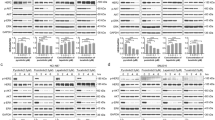Abstract
Purpose
To identify the molecular mechanisms responsible for tumor cell migration is essential for developing agents that can prevent the relapse or the metastatic spread of hepatocellular carcinoma (HCC).
Methods
In this study, we investigated the effects of the transforming growth factor-β receptor I inhibitor LY2109761 on two different human HCC cell lines, in vitro and in vivo.
Results
LY2109761 inhibits HCC migration in a dose-dependent manner. This inhibition is associated with the decreased phosphorylation of SMAD-2, FAK and β1-integrin, and with increased levels of E-cadherin. By contrast, LY2109761 did not alter the phosphorylation pattern of p38MAPkinase. In a two- and a three-day time-course and in dose-titration experiments, LY2109761 inhibited HCC migration as well as phospho-SMAD-2 and the adhesion proteins. LY2109761 showed the best effect on day 2 at 1 nM and for 3 days at 100 nM concentration. This suggests that maximum effects were sustained for several days and were not dependent on excess concentrations. Finally, in a xenograft model of HCC, LY2109761 strongly inhibits tumor growth, intravasation and metastasis at the aforementioned lower concentrations.
Conclusions
In conclusion, inhibition of transforming growth factor-β (TGF-β) appears to occur at low concentrations of LY2109761 that displays multiple effects on kinases that control HCC cell migration. These findings may help the design of future clinical trials with inhibitors of TGF-β.






Similar content being viewed by others
References
El Serag HB (2004) Hepatocellular carcinoma: recent trends in the United States. Gastroenterology 127:S27–S34
Llovet JM, Burroughs A, Bruix J (2003) Hepatocellular carcinoma. Lancet 362:1907–1917
Llovet JM, Ricci S, Mazzaferro V, Hilgard P, Gane E, Blanc JF, de Oliveira AC et al (2008) Sorafenib in advanced hepatocellular carcinoma. N Engl J Med 359:378–390
Bedossa P, Peltier E, Terris B, Franco D, Poynard T (1995) Transforming growth factor-beta 1 (TGF-beta 1) and TGF-beta 1 receptors in normal, cirrhotic, and neoplastic human livers. Hepatology 21:760–766
Tsai JF, Chuang LY, Jeng JE, Yang ML, Chang WY, Hsieh MY, Lin ZY, Tsai JH (1997) Clinical relevance of transforming growth factor-beta 1 in the urine of patients with hepatocellular carcinoma. Medicine (Baltimore) 76:213–226
Abou-Shady M, Baer HU, Friess H, Berberat P, Zimmermann A, Graber H, Gold LI et al (1999) Transforming growth factor betas and their signaling receptors in human hepatocellular carcinoma. Am J Surg 177:209–215
Giannelli G, Bergamini C, Fransvea E, Sgarra C, Antonaci S (2005) Laminin-5 with transforming growth factor-beta1 induces epithelial to mesenchymal transition in hepatocellular carcinoma. Gastroenterology 129:1375–1383
Fransvea E, Angelotti U, Antonaci S, Giannelli G (2008) Blocking transforming growth factor-beta up-regulates E-cadherin and reduces migration and invasion of hepatocellular carcinoma cells. Hepatology 47:1557–1566
Fransvea E, Mazzocca A, Antonaci S, Giannelli G (2009) Targeting transforming growth factor (TGF)-betaRI inhibits activation of beta1 integrin and blocks vascular invasion in hepatocellular carcinoma. Hepatology 49:839–850
Bergamini C, Sgarra C, Trerotoli P, Lupo L, Azzariti A, Antonaci S, Giannelli G (2007) Laminin-5 stimulates hepatocellular carcinoma growth through a different function of alpha6beta4 and alpha3beta1 integrins. Hepatology 46:1801–1809
Giannelli G, Bergamini C, Fransvea E, Marinosci F, Quaranta V, Antonaci S (2001) Human Hepatocellular Carcinoma (HCC) cells require both alpha3 beta1 integrin and matrix metalloproteinases activity for migration and invasion. Lab Invest 81:613–627
Mazzocca A, Fransvea E, Lavezzari G, Antonaci S, Giannelli G (2009) Inhibition of transforming growth factor beta receptor I kinase blocks hepatocellular carcinoma growth through neo-angiogenesis regulation. Hepatology 50:1140–1151
Liotta LA, Espina V, Mehta AI, Calvert V, Rosenblatt K, Geho D, Munson PJ et al (2003) Protein microarrays: meeting analytical challenges for clinical applications. Cancer Cell 3:317–325
Wulfkuhle JD, Aquino JA, Calvert VS, Fishman DA, Coukos G, Liotta LA, Petricoin EF, II I (2003) Signal pathway profiling of ovarian cancer from human tissue specimens using reverse-phase protein microarrays. Proteomics 3:2085–2090
Melisi D, Ishiyama S, Sclabas GM, Fleming JB, Xia Q, Tortora G, Abbruzzese JL, Chiao PJ (2008) LY2109761, a novel transforming growth factor beta receptor type I and type II dual inhibitor, as a therapeutic approach to suppressing pancreatic cancer metastasis. Mol Cancer Ther 7:829–840
Wu L, Derynck R (2009) Essential role of TGF-beta signaling in glucose-induced cell hypertrophy. Dev Cell 17:35–48
Li HY, McMillen WT, Heap CR, McCann DJ, Yan L, Campbell RM, Mundla SR et al (2008) Optimization of a dihydropyrrolopyrazole series of transforming growth factor-beta type I receptor kinase domain inhibitors: discovery of an orally bioavailable transforming growth factor-beta receptor type I inhibitor as antitumor agent. J Med Chem 51:2302–2306
Acknowledgments
We are grateful to Dr. Michael Lahn (Eli Lilly and Company) for critical review of the manuscript. This work was supported by the Italian Association Cancer Research (AIRC) grant to GG number 202240GNN.
Author information
Authors and Affiliations
Corresponding author
Rights and permissions
About this article
Cite this article
Fransvea, E., Mazzocca, A., Santamato, A. et al. Kinase activation profile associated with TGF-β-dependent migration of HCC cells: a preclinical study. Cancer Chemother Pharmacol 68, 79–86 (2011). https://doi.org/10.1007/s00280-010-1459-x
Received:
Accepted:
Published:
Issue Date:
DOI: https://doi.org/10.1007/s00280-010-1459-x




